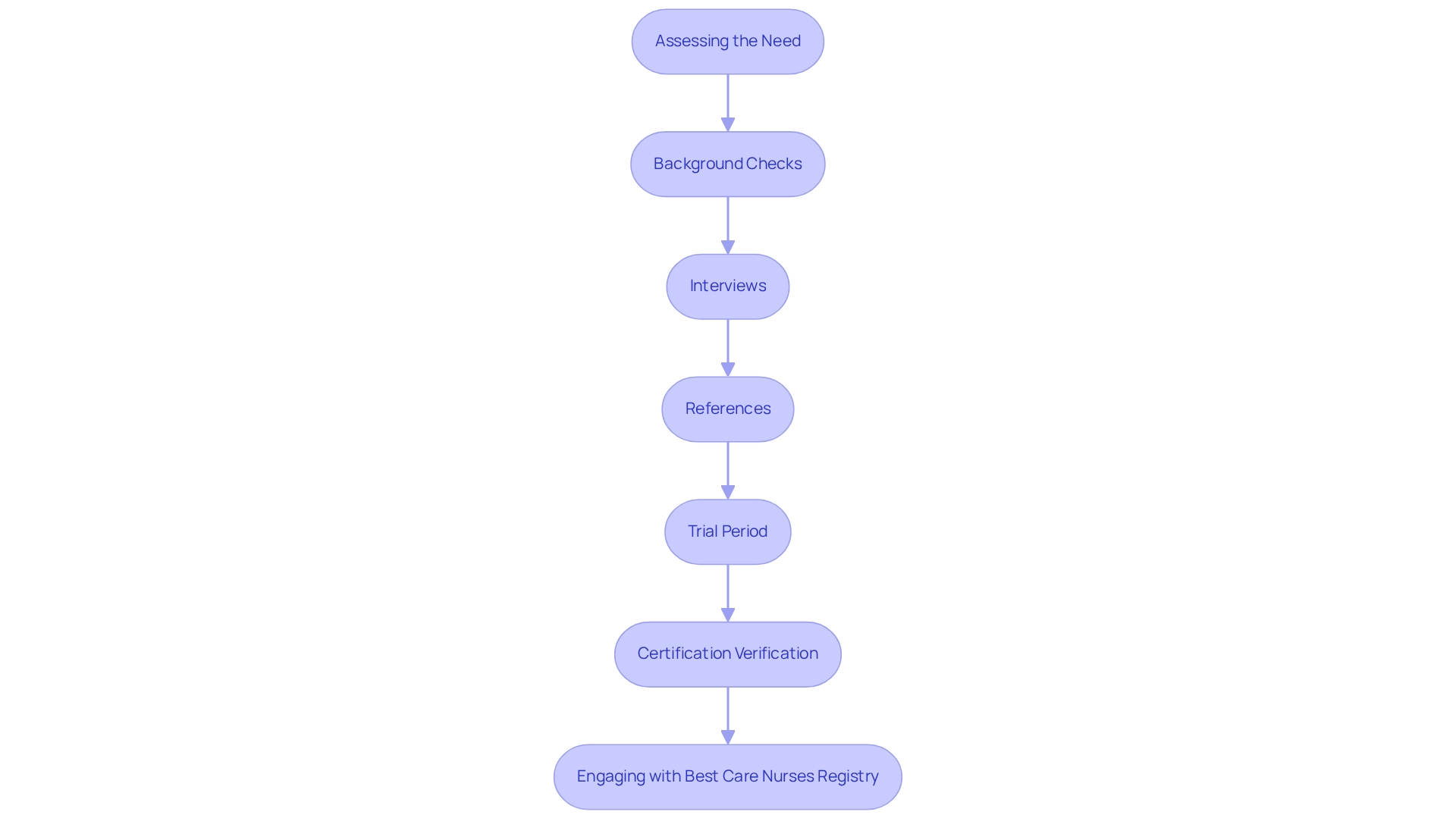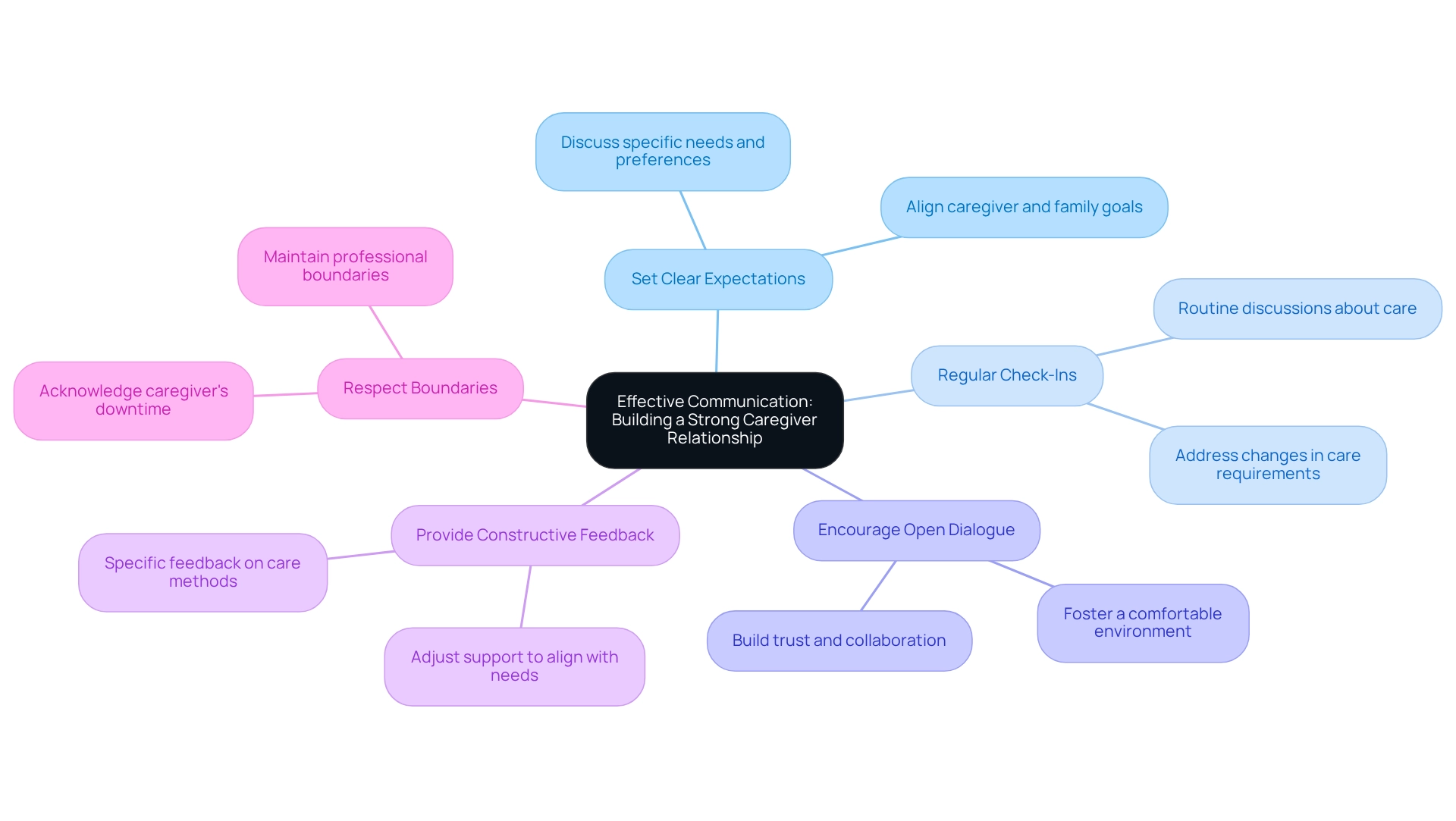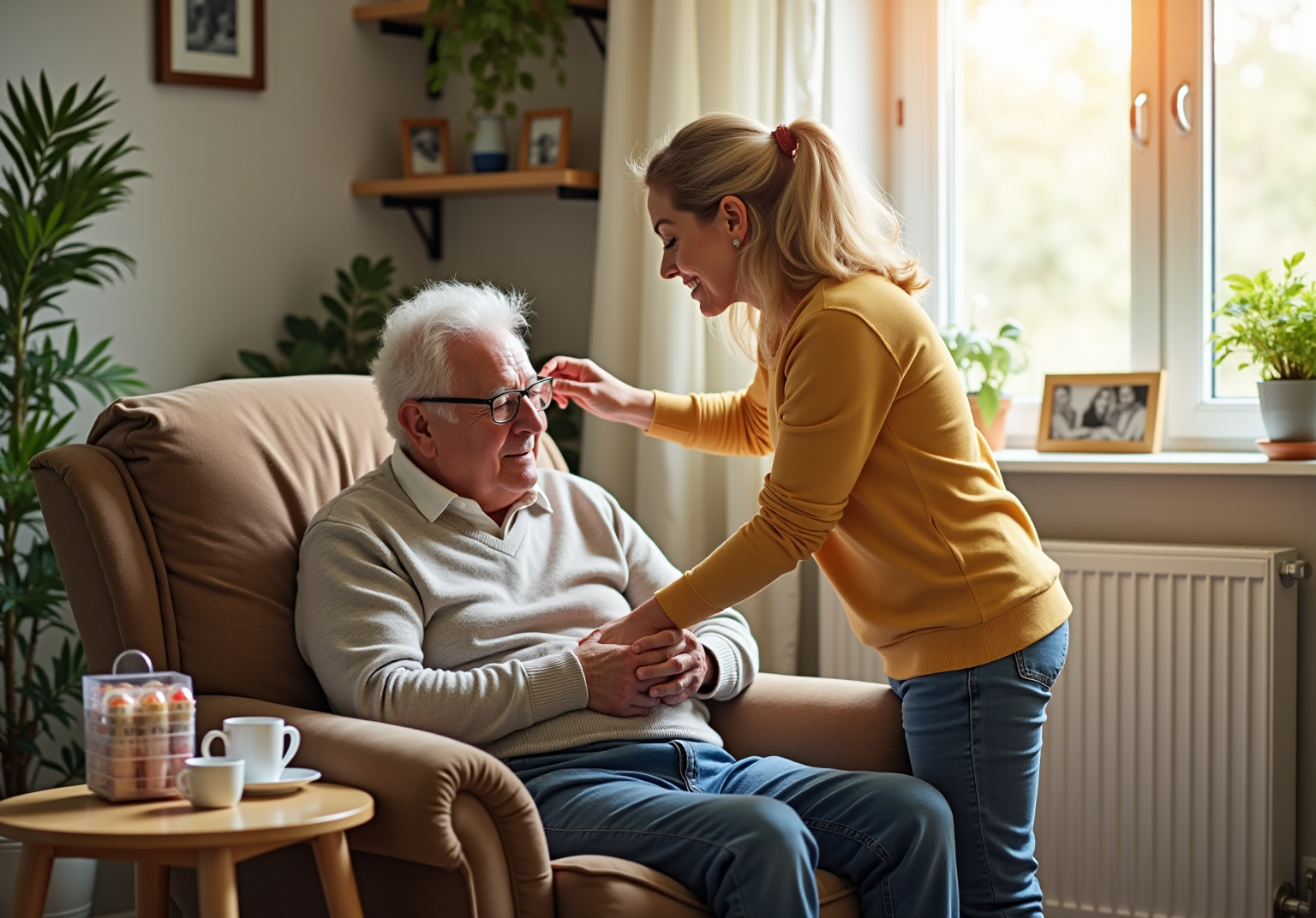Overview
Finding a home health aide near you can feel overwhelming, but understanding your specific care needs is the first step towards peace of mind. We encourage you to explore various resources, such as:
- Home support agencies
- Community organizations
- Personal referrals
Remember, you are not alone in this journey.
It’s essential to recognize your loved one’s unique requirements. By utilizing services like Best Care Nurses Registry, you can simplify the process of locating a suitable caregiver. This not only saves time but also enhances the quality of care provided, ensuring your loved one feels supported and cherished.
As you navigate this path, know that we’re here for you. Reaching out for help is a sign of strength, and every step you take is a step towards better care. Your comfort and the well-being of your loved one are our top priorities.
Introduction
In a world where the aging population is rapidly growing, the demand for compassionate and skilled home health aides has never been more critical. These dedicated professionals not only assist individuals with daily living activities but also provide essential emotional support and companionship. They foster a sense of dignity and independence for their clients, which is invaluable.
As families navigate the complexities of caregiving, understanding the multifaceted roles of home health aides becomes paramount. From personal care and health monitoring to ensuring safety and companionship, this article delves into the vital responsibilities of home health aides.
It offers insights on how to:
- Assess care needs
- Find the right caregiver
- Maintain effective communication for optimal care
With the right support, families can ensure their loved ones receive the quality care they deserve in the comfort of their own homes.
Understanding Home Health Aides: Roles and Responsibilities
A home health aide near me plays a crucial role in supporting individuals who require assistance with daily living activities, particularly among the aging population. Their primary responsibilities encompass a range of essential services, including:
- Personal Care: HHAs assist clients with bathing, dressing, grooming, and toileting, ensuring that personal hygiene and comfort are maintained. This personalized attention is vital for enhancing the quality of life for seniors, allowing them to maintain dignity and independence in their own homes.
- Companionship: They provide emotional support and companionship, essential for reducing feelings of isolation and enhancing overall well-being. At Best Care Nurses Registry, we recognize that companionship is as important as physical assistance, nurturing a sense of belonging and emotional security.
- Household Tasks: In addition to personal care, HHAs perform light housekeeping duties, meal preparation, and laundry, helping to create a safe and comfortable living environment. This support alleviates the burden on families, allowing them to focus on quality time with their loved ones.
- Wellness Monitoring: These professionals are trained to observe and report any changes in a client’s wellness status to family members or healthcare providers, facilitating timely interventions when necessary. This proactive approach ensures that wellness concerns are addressed promptly, enhancing safety and well-being.
- Medication Reminders: HHAs ensure that clients follow their medication schedules, promoting improved wellness and reducing the risk of complications. This essential service assists in preserving the well-being of seniors, enabling them to live more independently.
Recent statistics show that a considerable percentage of personal aides are committed to delivering personal assistance services, reflecting the increasing demand for such support as the Baby Boomer population ages. Projections indicate that the demand for support providers will keep increasing, fueled by workforce changes and retirements in the sector. As of May 2023, the median annual wage for all workers in this sector was approximately $48,060, highlighting the importance of these roles in the healthcare landscape.
Specialist views emphasize the essential nature of personal care offered by home care aides. They are not only providers of care but also essential parts of a support system that improves the quality of life for seniors. A case study named ‘The Future of Caregiving’ highlights the importance of strong support frameworks and regulations to meet the growing need for those who provide care, promoting extensive assistance for providers, such as increased paid family leave and mental wellness resources.
Understanding the diverse functions of a home health aide near me allows families to recognize their particular needs and how these professionals can proficiently address them, ensuring that loved ones receive the compassionate and tailored support they deserve. As Best Care Nurses Registry highlights, pairing clients with suitable caregivers is crucial to delivering the tailored assistance that improves the quality of life for seniors and those with chronic conditions. The primary guideline of caregiving is to prioritize your own well-being first, a principle that aligns closely with Best Care’s dedication to compassionate support.
If you are seeking devoted and empathetic personal support services, reach out to Best Care Nurses Registry today at (888) 203-2529 to discuss your requirements and arrange a consultation. We are here to assist you and your cherished ones live comfortably and securely in your residence.
Assessing Your Care Needs: What to Consider
Before hiring a home health aide near you, it’s important to thoughtfully assess the assistance needs of yourself or your loved one. This evaluation should encompass several key factors:
- Health Conditions: It’s crucial to identify any chronic illnesses or disabilities that require specialized care. Without the right medical oversight and support, chronic conditions can worsen, and new medical issues might go unnoticed. Did you know that approximately 20% of older adults face mobility limitations? This can greatly impact their independence and daily activities. Understanding these medical conditions is vital for determining the level of care needed.
- Daily Activities: Consider which daily tasks are challenging and require assistance. Many seniors find activities like bathing, cooking, and managing medications difficult. Research shows that home modifications and training can effectively reduce fall risks and help older adults perform these tasks safely. For example, the case study titled “Home Modifications and Fall Prevention” illustrates how such changes can significantly enhance safety and independence for seniors. Moreover, without help in meal preparation, seniors may struggle with proper nutrition, affecting their overall well-being.
- Social Interaction: Think about the importance of companionship and social engagement, especially for seniors living alone. Social isolation can lead to feelings of depression and anxiety, making it essential to consider the need for regular interaction. Caregiver companionship can alleviate loneliness and promote mental and emotional well-being.
- Safety Concerns: Evaluate the living environment for potential safety hazards. Designing dementia-friendly spaces can support safety and independence for individuals with cognitive impairments. This approach not only addresses safety but also enhances the overall quality of life for seniors. The inability to manage household tasks can create an unsafe living environment, increasing the risk of accidents.
- Budget: Understand your financial situation and determine how much you can allocate for home health assistance services. This will help you choose a provider who fits your budget while still meeting your support needs. Knowing that a skilled professional is providing high-quality care can ease stress and anxiety for family members, allowing them to focus on their own well-being.
Taking the time to assess these factors will help you find a home health aide nearby who can deliver the appropriate level of support tailored to individual needs, ultimately enhancing the quality of life for seniors. With around 3.0 million patients receiving and completing treatment in 2020, the importance of a comprehensive evaluation cannot be overstated. It ensures that the right support is available for those who need it most. Additionally, utilizing services from Best Care Nurses Registry can offer significant benefits, including improved quality of life and peace of mind for family members.
CNAs (Certified Nursing Assistants) receive extensive training focused on medical responsibilities, while HHAs (Home Health Aides) concentrate on personal support and daily living activities. This ensures that the right type of caregiver is matched with the specific needs of seniors.
Where to Look: Finding Home Health Aides in Your Area
Finding the right home health assistant can feel overwhelming, but there are effective channels to help you in this journey.
Home Support Agencies: Start by reaching out to local home support agencies that specialize in providing trained aides. One excellent option is Best Care Nurses Registry, which offers personalized consultations to discuss your unique needs and create a tailored support plan. These agencies often maintain a list of thoroughly screened professionals, ensuring a high standard of care. In fact, around 3.0 million patients received care from home health agencies in 2020, underscoring the importance of these services. You can also explore online platforms like Care.com and A Place for Mom, where user reviews and service comparisons can guide you in finding the right fit. Keep in mind that certified support providers earn an average base pay of $15.65 per hour, which can inform your budgeting.
Community Resources: Don’t forget to leverage local resources like the Eldercare Locator or Area Agencies on Aging. These organizations can connect you with services available in your community, providing valuable assistance in your search.
Referrals: Consider seeking recommendations from friends, family, or healthcare providers who have had positive experiences with caregivers. Personal referrals can lead you to trustworthy options. A recent case analysis revealed that 89% of patients were satisfied with residential healthcare services, offering reassurance about the quality of care you can expect.
Social Media and Community Boards: Additionally, explore local Facebook groups or community boards, which can be great platforms for finding independent support providers. These spaces often feature posts from individuals offering their services or seeking support. It’s also important to be aware of the job market for personal support aides in Florida, where the employment rate is 8.28 per 1,000 positions, lower than the national average of 24.30.
By considering these alternatives, including the tailored assistant matching service from Best Care Nurses Registry, you can effectively identify potential candidates, such as a home health aide near you, who meet your care needs. We’re here for you, ensuring you find the appropriate support for yourself or your loved ones. To get started, please call (888) 203-2529 to schedule a consultation and discuss your specific needs.
Vetting Candidates: Ensuring Quality and Trustworthiness
Once you’ve identified potential health aides, it’s essential to carry out a comprehensive vetting process to ensure quality and reliability. With around 1.4 million Canadians receiving assistance at home in 2020, the need for a dependable home health aide is clear. Here are key steps to follow:
- Assessing the Need: Before beginning the vetting process, take a moment to evaluate whether your loved one requires CNA/HHA caregiver services. Are there signs of difficulty with personal hygiene, dressing, cooking, cleaning, or managing medications? Health issues like chronic ailments or recent surgeries may also indicate the need for ongoing support from a home health aide.
- Background Checks: Initiate thorough background checks to verify the candidate’s criminal history, employment history, and qualifications. This step is crucial, as studies show that many families prioritize the safety and reliability of those providing care. Background checks are a non-negotiable aspect of the hiring process. As highlighted in the case study ‘Importance of Background Checks in Home Support Services,’ implementing these checks not only reduces risks for clients but also enhances the reputation and reliability of home health aides.
- Interviews: Schedule interviews to assess their experience, skills, and compatibility with your loved one. Prepare targeted questions that explore their caregiving philosophy and how they would handle specific scenarios. Research indicates that families typically conduct three to five interviews before making a hiring decision, underscoring the importance of this step.
- References: Request and contact references from previous employers or clients to gain insights into the aide’s reliability and performance. Speaking directly with past employers can provide valuable context about the aide’s work ethic and interpersonal skills.
- Trial Period: Consider implementing a trial period to observe how the aide interacts with your loved one and whether they meet your expectations. This allows both the provider and your family to evaluate compatibility in a real-world setting.
- Certification Verification: Ensure that the aide possesses the necessary certifications and training relevant to their role. This verification not only validates their qualifications but also reassures families about the aide’s proficiency in delivering support.
- Engaging with Best Care Nurses Registry: To begin the process, please call Best Care Nurses Registry at (888) 203-2529 to discuss your needs. Our welcoming team is here to assist you in developing a support plan that ideally meets your loved one’s needs and recommends empathetic providers for you to select from.
By following these steps, you can choose a home health aide who is not only qualified but also a good match for your family, ultimately improving the quality of assistance that your loved one receives. Furthermore, maintaining transparent dialogue with the support provider and Best Care Nurses Registry is crucial to ensure quality assistance. As Noel, Senior Marketing Manager & Content Manager for the HR and Compliance business unit at Mitratech, emphasizes, “The importance of background checks in caregiving cannot be overstated; they provide peace of mind for families and ensure that caregivers are properly vetted.

Understanding Costs: Budgeting for Home Health Care
Planning for residential support can feel overwhelming, especially when considering the costs associated with hiring a personal assistant. Understanding these expenses is crucial for ensuring that you can provide the best care for your loved ones. Here are some essential considerations to keep in mind:
- Hourly Rates: The cost of hiring a home health aide can vary significantly based on factors such as location, experience, and the specific level of care needed. In South Florida, the average hourly rate typically ranges from $20 to $40. This variability underscores the importance of researching local rates to find a service that fits your budget. As of May 2023, the median yearly salary for all employees was $48,060, providing context for salary expectations in the domestic support sector.
- Insurance Coverage: It’s essential to determine whether your health insurance or long-term support insurance policy includes any in-home health assistance services. Best Nurses Registry accepts most long-term insurance plans directly on your behalf, significantly lowering out-of-pocket costs. Many policies may provide partial coverage, and understanding these options is vital for effective budgeting. As Vicki Demirozu, a specialist in domestic support, emphasizes, “Navigating insurance can be intricate, but it’s vital for budgeting efficiently for residential assistance.”
- Payment Options: When discussing assistance with an agency or caregiver, inquire about various payment arrangements. Best Care Nurses Registry collaborates with most carriers and can assist in completing the necessary paperwork, including the assignment of benefits (AOB), allowing you to direct the carrier to pay Best Care directly. Options may include hourly rates, flat fees for specific services, or flexible payment plans that can accommodate your financial situation.
- Financial Support: Explore government initiatives like Medicaid or community resources that may provide financial aid for in-home services. These programs can offer vital support, especially for families facing financial constraints. Reaching out to local Area Agencies on Aging or Departments of Elder Affairs can be a beneficial step in discovering available assistance programs for residences.
- Budgeting for Extra Costs: Beyond the main expenses of employing a personal care assistant, it’s crucial to consider potential extra charges. This may involve transportation, medical supplies, or specialized equipment essential for your loved one’s support. The variability in state policies, as highlighted in recent case studies, demonstrates how reimbursement rates can affect overall budgeting for home health services.
By developing a comprehensive budget, you can manage these costs effectively and ensure that you provide the essential support your loved one deserves without financial strain. Understanding the costs and exploring available resources, including the personalized assistance offered by Best Care Nurses Registry, empowers families to make informed choices that prioritize both quality support and financial stability.
Effective Communication: Building a Strong Caregiver Relationship
Establishing a strong connection with a home health aide near you is vital for ensuring effective support. Here are several strategies to enhance communication:
- Set Clear Expectations: Begin by discussing your loved one’s specific needs, preferences, and daily routines with the caregiver. This clarity ensures that everyone involved is aligned, allowing for the best possible support.
- Regular Check-Ins: Create a routine for regular check-ins to address any concerns, changes in care requirements, or feedback regarding the caregiving experience. These discussions can help identify areas for improvement and strengthen the provider’s understanding of the client’s evolving needs.
- Encourage Open Dialogue: Foster an environment where both you and the provider feel comfortable sharing thoughts and concerns. Open communication builds trust and collaboration, essential for effective caregiving. Research on effective non-verbal communication shows that context and external factors significantly influence communication effectiveness, leading to improved patient adherence and quality of care.
- Provide Constructive Feedback: Offer specific feedback to the provider about what is working well and what could be improved. This not only helps the provider adjust their methods but also enables them to offer support that aligns more closely with your loved one’s needs. Studies indicate that those who engage in regular, meaningful communication with families are better equipped to meet their clients’ needs, resulting in improved adherence to treatment plans and higher satisfaction rates among recipients.
- Respect Boundaries: While maintaining open lines of communication is vital, it is equally important to respect the professional boundaries and personal time of those providing support. Acknowledging their need for downtime can contribute to a healthier working relationship.
Remember, communication is a two-way street. Effective communication can significantly enhance the quality of service and improve the overall experience for both the provider and the client. Additionally, the importance of effective communication training for family caregivers, especially in interactions with persons with dementia, highlights the relevance of these strategies in caregiving scenarios.

Monitoring Care: Ensuring Quality and Satisfaction
Supervising the assistance provided by your personal support worker is essential for ensuring quality and satisfaction. Here are effective steps to oversee support:
- Regular Assessments: Regular evaluations of your loved one’s health and well-being are crucial. Approximately 14 million Americans over 80 rely on home assistance, underscoring the importance of having a home health aide nearby to identify any changes that may necessitate adjustments in support. Best Care Nurses Registry, with its extensive experience and strong reputation in South Florida, emphasizes these assessments to maintain high-quality care and determine if additional CNA/HHA services are required. Signs that may indicate the need for these services include challenges with personal hygiene, dressing, cooking, cleaning, or managing medications.
- Feedback Mechanism: Establishing a feedback system allows both the support provider and family members to share observations and concerns about the assistance being offered. Open communication fosters a collaborative atmosphere that enhances service quality, reflecting Best Care’s commitment to personalized assistance and ensuring that the provider’s focus aligns with your loved one’s specific needs.
- Documentation: Keeping a detailed record of support activities, changes in health status, and any incidents is vital. This documentation serves as a useful reference for future discussions with healthcare providers and can assist in evaluating the effectiveness of the services provided. Best Care’s comprehensive caregiver screening ensures that families can trust the quality of assistance offered, which is especially crucial for those managing chronic conditions or recovering from surgeries.
- Family Involvement: Encouraging family members to actively engage in the support process not only provides additional assistance but also offers insights that can significantly enhance the caregiving experience. Research indicates that family involvement in monitoring home health aide services leads to improved outcomes for patients, highlighting the importance of a collaborative approach in assessing the need for companion or sitter services.
- Adjust Plans: Being adaptable and open to modifying plans based on feedback and evaluations is essential. This flexibility ensures that the support provided remains aligned with your loved one’s evolving needs, ultimately enhancing their independence and quality of life. Best Care’s adaptable service options facilitate such modifications, reinforcing their commitment to compassionate assistance tailored to individual needs.
By actively overseeing support, families can ensure that their loved ones receive the highest quality of care, reinforcing the dedication to compassionate and personalized support that organizations like Best Care Nurses Registry embody. Furthermore, understanding the differences between CNAs and HHAs can help families make informed decisions about the type of support needed. CNAs typically receive more extensive training focused on medical tasks, while HHAs concentrate on personal care and daily living activities.
For assistance in evaluating your loved one’s needs, we invite you to contact Best Care Nurses Registry today.
Conclusion
Home health aides are truly indispensable allies in the caregiving journey, especially as our population ages and the need for compassionate support continues to grow. Their diverse roles—ranging from providing personal care and companionship to health monitoring and assistance with daily tasks—underscore the vital contributions they make in enhancing the quality of life for seniors. As families navigate the complexities of caregiving, understanding how to assess care needs, find the right caregiver, and establish effective communication is essential.
Selecting the right home health aide involves a thoughtful process. This includes thorough assessments of individual needs, careful vetting of candidates, and ongoing monitoring of care quality. By prioritizing these steps, families can ensure their loved ones receive not only the physical assistance they require but also the emotional support that fosters a sense of dignity and independence.
Ultimately, the caregiving journey thrives on collaboration and understanding. With the right resources and support, families can create a nurturing environment that allows their loved ones to flourish in the comfort of their own homes. Engaging with professional agencies like Best Care Nurses Registry can provide the personalized care necessary to meet these goals. This ensures that both caregivers and care recipients can experience the benefits of a well-structured support system. The commitment to compassionate care enriches the lives of seniors, bringing peace of mind to their families. It truly is a worthy investment for a better tomorrow.
Frequently Asked Questions
What is the role of a home health aide?
A home health aide (HHA) plays a crucial role in supporting individuals who require assistance with daily living activities, particularly among the aging population. Their responsibilities include personal care, companionship, household tasks, wellness monitoring, and medication reminders.
What kind of personal care do home health aides provide?
Home health aides assist clients with bathing, dressing, grooming, and toileting, ensuring personal hygiene and comfort. This personalized attention helps enhance the quality of life for seniors, allowing them to maintain dignity and independence at home.
How do home health aides contribute to companionship?
Home health aides provide emotional support and companionship, which is essential for reducing feelings of isolation and enhancing overall well-being. This emotional connection nurtures a sense of belonging and security for clients.
What household tasks do home health aides perform?
In addition to personal care, home health aides perform light housekeeping duties, meal preparation, and laundry, helping to create a safe and comfortable living environment for their clients.
How do home health aides monitor wellness?
Home health aides are trained to observe and report any changes in a client’s wellness status to family members or healthcare providers. This proactive approach ensures that wellness concerns are addressed promptly, enhancing safety and well-being.
What is the importance of medication reminders provided by home health aides?
Home health aides ensure that clients follow their medication schedules, which promotes improved wellness and reduces the risk of complications. This essential service helps seniors maintain their health and independence.
What factors should be assessed before hiring a home health aide?
Key factors to assess include health conditions, daily activities that require assistance, the need for social interaction, safety concerns in the living environment, and budget for home health assistance services.
Why is it important to understand the health conditions of the individual needing assistance?
Identifying chronic illnesses or disabilities is crucial for determining the level of care needed. Without appropriate medical oversight, chronic conditions can worsen, and new medical issues may go unnoticed.
How does social interaction impact seniors living alone?
Social isolation can lead to feelings of depression and anxiety. Regular interaction and companionship from caregivers can alleviate loneliness and promote mental and emotional well-being.
What should families consider regarding safety when assessing care needs?
Families should evaluate the living environment for potential safety hazards and consider modifications that can support safety and independence, especially for individuals with cognitive impairments.
How do Certified Nursing Assistants (CNAs) differ from Home Health Aides (HHAs)?
CNAs receive extensive training focused on medical responsibilities, while HHAs concentrate on personal support and daily living activities. This ensures that the right type of caregiver is matched with the specific needs of seniors.











